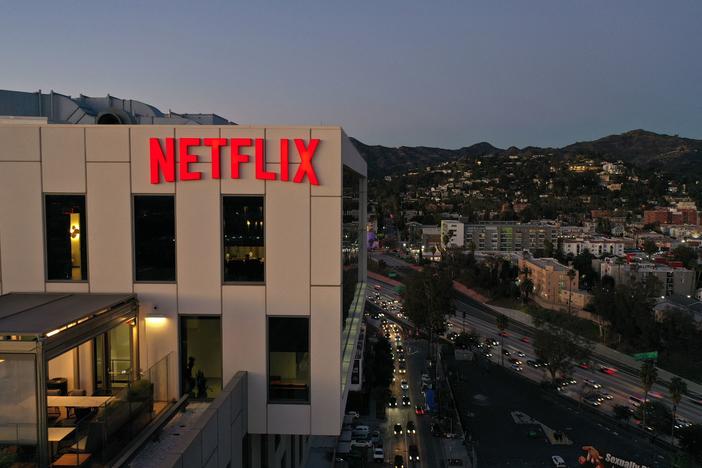Section Branding
Header Content
Writers Guild of America strikes for higher wages and better health care
Primary Content
The Writers Guild of America has gone on strike against major Hollywood studios after both parties were unable to agree on a new contract. Picketing started Tuesday afternoon in New York and L.A.
Transcript
SACHA PFEIFFER, HOST:
Many of the most popular late-night shows on TV...
(SOUNDBITE OF MONTAGE)
UNIDENTIFIED ANNOUNCER: From Hollywood, it's "Jimmy Kimmel Live!"
JIMMY FALLON: Welcome, welcome, welcome to "The Tonight Show." You are here.
(CHEERING)
SETH MYERS: And that's a joke for old people. We did it.
STEPHEN COLBERT: They've created something called the Colbert Questionnaire, which is...
(CHEERING)
PFEIFFER: ...Are set to go dark tonight. That's because the Writers Guild of America - the people who write these shows - continues to strike. "The Late Night Show With Stephen Colbert" (ph), "Late Night With Seth Meyers," "The Tonight Show Starring Jimmy Fallon" and "Jimmy Kimmel Live!" will all be in reruns for now. The writers say they're striking for higher wages and better health care. The last Writers Guild strike started in 2007 and lasted 100 days. NPR's culture correspondent Mandalit del Barco is at one site where there's picketing, and she joins us now live. Hi, Mandalit.
MANDALIT DEL BARCO, BYLINE: Hi, how are you?
PFEIFFER: Good. Where are you, and what's happening where you are?
DEL BARCO: Well, I'm here in Hollywood, outside Netflix, which is one of the studios that is part of the Alliance of Motion Picture and Television Producers. That's the group that's been negotiating with the WGA. There's a group of writers here who are chanting and holding picket signs that say things like - why don't you try to write a script? - and also - don't you want to see how "The Last Of Us" ends? - referencing...
(SOUNDBITE OF CAR HORNS HONKING)
DEL BARCO: ...To the HBO series. You can now hear the cars honking as they go by.
PFEIFFER: (Laughter).
DEL BARCO: There are other picket lines outside the major studios around town - Disney, Amazon, Warner Brothers, NBCUniversal, Paramount and Sony. Writers are also picketing in New York. And actors and directors and people behind the scenes may be joining these lines since their unions have been supportive of the WGA writers. This strike means production in Hollywood is expected to stop.
PFEIFFER: Mandalit, we mentioned that the writers are asking for higher pay. They especially want that because streaming services have taken over the media landscape and changed how they've paid - to the negative. Can you tell us what else they want in their new contract?
(SOUNDBITE OF CAR HORNS HONKING)
DEL BARCO: Well, writers say they're now in an existential crisis, with half of them working at the union's minimum wage. The writers say the companies are making so much money from their work and not sharing the profits with them fairly. The streamers, for example, are ordering fewer episodes each season for them to write. Writers say they're being paid very, very little for residuals when streamers rerun their work. I talked to one writer who is on the WGA negotiating team, Danielle Sanchez-Witzel. And until last night, she was working here at Netflix on an upcoming show called "Survival Of The Thickest."
DANIELLE SANCHEZ-WITZEL: Studios are trying to pay us as little as possible for the least amount of time as possible. And we're here to say that's not how we make the movies and the television that - you know, that audiences watch, that they sell and that they make billions of dollars off of.
(SOUNDBITE OF HORN HONKING)
DEL BARCO: Danielle and the other writers say they've become gig workers, worried about their next jobs. And they don't like having to write in what are called mini rooms, working on spec, often at minimum pay, on scripts that may or may not get the green light. And writers complained that these mini rooms are often understaffed, and there's no guarantee that the people in them will get to stay on them as writers, even if the show gets picked up. One other concern, though, is the use of artificial intelligence in writing screenplays and scripts. The writers want to make sure their intellectual property is protected.
PFEIFFER: They're striking because they weren't able to successfully negotiate a contract. What were some of the sticking points in those negotiations?
(SOUNDBITE OF CAR HORNS HONKING)
DEL BARCO: Well, the studios' alliance - the AMPTP - said that they offered the writers higher base pay and residuals, but they said the sticking points were the union's demands for mandatory staffing and duration of employment. You know, the economy has been uncertain, and keep in mind that some studios, even here at Netflix, have been laying off employees. The WGA's proposal called for the so-called mini rooms to be staffed by at least six writers - four of them as writer/producer so that they'll get paid more - and they also want a guaranteed minimum of 10 weeks of work for those mini rooms.
PFEIFFER: How could this strike compare to the last one from 15 or 16 years ago?
DEL BARCO: Well, you know, yes, we've seen this movie before, but it was a different time then. In 2007, Hollywood was shut down for more than three months, and it cost billions of dollars to the economy. And even before that, in 1988, the writers went on strike for five months. As you mentioned, the late-night shows are off tonight. "Saturday Night Live" is next, and then maybe soap operas and so on and so on - depends on how long the strike goes.
PFEIFFER: That's NPR's Mandalit del Barco. Thank you.
DEL BARCO: Thank you. Transcript provided by NPR, Copyright NPR.
Bottom Content



